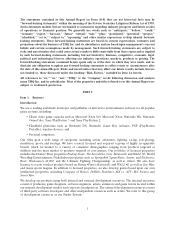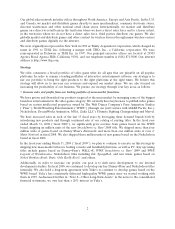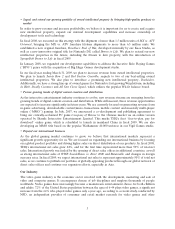THQ 2008 Annual Report Download - page 17
Download and view the complete annual report
Please find page 17 of the 2008 THQ annual report below. You can navigate through the pages in the report by either clicking on the pages listed below, or by using the keyword search tool below to find specific information within the annual report.Item 1A. Risk Factors
Our business is subject to many risks and uncertainties that may affect our future financial performance.
Some of those important risks and uncertainties that may cause our operating results to vary or may
materially and adversely affect our operating results are as follows:
We must continue to develop and sell new titles in order to generate revenue and remain profitable.
We derive almost all of our revenue from sales of interactive software games designed for play on video
game consoles, handheld devices and personal computers. Even the most successful video games remain
popular for only limited periods of time, often less than six months, and thus the success of our business is
dependent upon our ability to continually develop and sell successful new games.
Our business is ‘‘hit’’ driven. If we do not deliver ‘‘hit’’ games, our revenue and profitability can suffer.
While many new products are regularly introduced, only a relatively small number of ‘‘hit’’ titles account
for a significant portion of video game sales. If we fail to develop ‘‘hit’’ titles, or if ‘‘hit’’ products published
by our competitors take a larger share of consumer spending than we anticipate, our product sales could
fall below our expectations.
Risk factors related to video game platforms:
Our business is dependent upon the success and availability of the video game platforms on which consumers play
our games. We derive most of our revenue from the sale of products for play on video game platforms
manufactured by third parties, such as Sony’s PlayStation 2, PlayStation 3 and PSP, Microsoft’s Xbox 360,
and Nintendo’s Wii and DS. The following factors related to such platforms can adversely affect sales of
our video games and our profitability:
Popularity of platforms. In the previous console platform cycle, the PlayStation 2 was the best-selling
platform and games for the PlayStation 2 dominated software sales. In the current platform cycle, the Wii
is the best-selling platform to date; however, the Xbox 360 is currently the most popular console in terms
of software game sales. Since the development cycle for a game is from 12 to 36 months, we must make
decisions about which games to develop on which platforms before knowing what the consumer preference
for the platforms will be when the game is finished. Choosing the wrong games for the wrong platforms
could negatively impact our revenues and profitability.
Platform shortages. In the past few years, many of the platforms on which our games are played have
experienced shortages and some, including the Nintendo Wii, are still difficult for consumers to purchase.
Platform shortages generally negatively affect the sales of video games since consumers do not have
consoles on which to play the games.
Platform pricing. The current generation of console platforms are priced higher than their respective
predecessor platforms. The Xbox 360 can cost as much as $449.99, the Wii is priced at $249.99 and the PS3
is priced at $399.99. The cost of the hardware could adversely affect their sales, which could negatively
affect sales of our products for these platforms since consumers need a platform in order to play our
games.
Our inability to enter into agreements with the manufacturers to develop, publish and distribute titles on their
platforms could seriously impact our operations. We are dependent on the platform manufacturers
(Microsoft, Nintendo and Sony) and our non-exclusive licenses with them, both for the right to publish
titles for their platforms and for the manufacture of our products for their platforms. Our existing platform
licenses require that we obtain approval for the publication of new games on a title-by-title basis. As a
result, the number of titles we are able to publish for these platforms, and our sales from titles for these
platforms, may be limited. Should any manufacturer choose not to renew or extend our license agreement
9
























